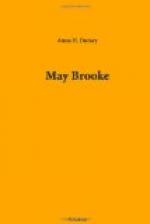“She’s no more dependent than you are.”
“No, sir; but—but then I am happy somehow. It is the state of life Almighty God has chosen for me, and I should be very ungrateful to him and you if I repined and grumbled,” said May, cheerfully.
“If He chose it for you, I suppose he chose it for her too; for I didn’t. At any rate, don’t waste any more candles or coal sitting up to watch people crying, and tell what’s-her-name to rise when you do; she’s no better than you are; and let her take her share of the duties of the house to-morrow,” said Mr. Stillinghast, surlily.
“Helen will soon feel at home, sir, no doubt; only do—do, dear uncle, try and speak kindly to her for a few days, on account of her lonely situation.”
“Fudge! eat your breakfast. Hold your plate here for some of this broiled beef, and eat it to prevent its being wasted.”
“Thank you, sir,” said May, laughing, as he laid a large slice on her plate, which, however she did not touch, but put it aside for Helen; then observing that Mr. Stillinghast had finished his breakfast, she wheeled his chair nearer the fire, handed him his pipe, and the newspaper, and ran upstairs, to see if Helen was awake. But she still slept, and looked so innocently beautiful, that May paused a few moments by her pillow, to gaze at her. “She is like the descriptions which the old writers give us of the Blessed Virgin,” thought May; “that high, beautifully chiseled nose; those waves of golden hair; those calm finely cut lips, that high, snowy brow, and those long, shadowy eyelashes, lying so softly on her fair cheeks, oh, how beautiful! It seems almost like a vision, only—only I know that this is a poor frail child of earth; but, oh! immaculate Mother, cherish, guard, and guide her, that her spirit may be conformed to thine.”
“I suppose,” said Mr. Stillinghast, when May came down, “that you’ll go trotting presently through the snow and ice to church.”
“No, sir; I fear I cannot go this morning,” said May.
“Cannot go? well, really! I wonder if an earthquake will swallow me before I get to the wharf today,” said Mr. Stillinghast, drawing on his boots.
“I trust not, sir; I’d be happier to go, but Helen is a stranger, and she might awake when I am gone, and want something. To-morrow we will go together.”
“So, there’s to be a regular popish league in my house, under my very nose,” he growled.
“Which will do you no evil, dear uncle, in soul, body, or estate; but you had better wrap this comfort around your throat; I finished knitting it last night for you,” said May, in her quiet, cheerful way.
“For me, eh? It is very nice and soft—so—that does very well,” said Mr. Stillinghast, while one of those rare gleams, like sunshine, shot over his countenance.
“I shall be very happy all day, sir,” said May, gathering up the cups and saucers.




